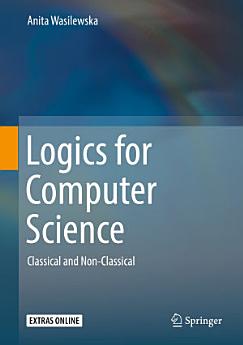Logics for Computer Science: Classical and Non-Classical
Anita Wasilewska
Nov 2018 · Springer
Ebook
535
Pages
reportRatings and reviews aren’t verified Learn More
About this ebook
Providing an in-depth introduction to fundamental classical and non-classical logics, this textbook offers a comprehensive survey of logics for computer scientists. Logics for Computer Science contains intuitive introductory chapters explaining the need for logical investigations, motivations for different types of logics and some of their history. They are followed by strict formal approach chapters. All chapters contain many detailed examples explaining each of the introduced notions and definitions, well chosen sets of exercises with carefully written solutions, and sets of homework.
While many logic books are available, they were written by logicians for logicians, not for computer scientists. They usually choose one particular way of presenting the material and use a specialized language. Logics for Computer Science discusses Gentzen as well as Hilbert formalizations, first order theories, the Hilbert Program, Godel's first and second incompleteness theorems and their proofs. It also introduces and discusses some many valued logics, modal logics and introduces algebraic models for classical, intuitionistic, and modal S4 and S5 logics.The theory of computation is based on concepts defined by logicians and mathematicians. Logic plays a fundamental role in computer science, and this book explains the basic theorems, as well as different techniques of proving them in classical and some non-classical logics. Important applications derived from concepts of logic for computer technology include Artificial Intelligence and Software Engineering. In addition to Computer Science, this book may also find an audience in mathematics and philosophy courses, and some of the chapters are also useful for a course in Artificial Intelligence.
While many logic books are available, they were written by logicians for logicians, not for computer scientists. They usually choose one particular way of presenting the material and use a specialized language. Logics for Computer Science discusses Gentzen as well as Hilbert formalizations, first order theories, the Hilbert Program, Godel's first and second incompleteness theorems and their proofs. It also introduces and discusses some many valued logics, modal logics and introduces algebraic models for classical, intuitionistic, and modal S4 and S5 logics.The theory of computation is based on concepts defined by logicians and mathematicians. Logic plays a fundamental role in computer science, and this book explains the basic theorems, as well as different techniques of proving them in classical and some non-classical logics. Important applications derived from concepts of logic for computer technology include Artificial Intelligence and Software Engineering. In addition to Computer Science, this book may also find an audience in mathematics and philosophy courses, and some of the chapters are also useful for a course in Artificial Intelligence.
About the author
Professor Anita Wasilewska has been teaching a "logic for computer science" class for many years, using presentation slides for ease of comprehension. She earned her Master Degree in Computer Science and Ph.D. in Mathematics from Warsaw University, where she consequently was a faculty of the Mathematics Department from 1967 to 1983. She came to the United States in 1980 as a visiting Assistant Professor in Mathematics at Wesleyan and Yale Universities in Connecticut, before joining Stony Brook’s Department of Computer Science in 1986.
She has also published papers, books, and edited books in many domains ranging from Classical and Non-Classical Logics, Automated Theorem Proving, Formal Languages, Theory of Programs, Foundations of Rough Sets in which she was one of the pioneers, to generalized Fuzzy and Rough sets, and Machine Learning.
She has also published papers, books, and edited books in many domains ranging from Classical and Non-Classical Logics, Automated Theorem Proving, Formal Languages, Theory of Programs, Foundations of Rough Sets in which she was one of the pioneers, to generalized Fuzzy and Rough sets, and Machine Learning.
Rate this ebook
Tell us what you think.
Reading information
Smartphones and tablets
Install the Google Play Books app for Android and iPad/iPhone. It syncs automatically with your account and allows you to read online or offline wherever you are.
Laptops and computers
You can listen to audiobooks purchased on Google Play using your computer's web browser.
eReaders and other devices
To read on e-ink devices like Kobo eReaders, you'll need to download a file and transfer it to your device. Follow the detailed Help Center instructions to transfer the files to supported eReaders.




